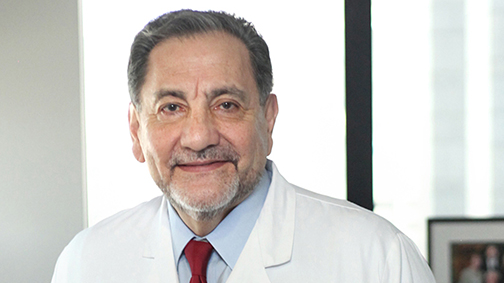Novel Non-Addictive, Non-Toxic Painkiller Developed at LSU Health New Orleans
May 16, 2024
LSU Health New Orleans announces the discovery and clinical advancement of a new non-opioid therapeutic candidate for treatment of acute, chronic, and neuropathic pain and migraine headaches which does not have the organ toxicity or addiction potential of other currently-available pain therapeutics.
Dr. Nicolas Bazan, Boyd Professor and Director of the Neuroscience Center of Excellence, led the team that discovered this innovative therapeutic and is the senior author of this week’s publication in Nature’s Scientific Reports. This new peer-reviewed manuscript provides in-depth insights into the novel compound’s activity and mechanism while also confirming gene expressions and signaling networks in the brain that are critical to managing and treating pain.
With great enthusiasm, Dr. Bazan says: “Our research offers hope for millions suffering from pain while also providing a pathway to counteract addiction. This extensive study also validates the entrepreneurial and translational potential of the research conducted at the LSU Health Neuroscience Center of Excellence. By understanding and harnessing the brain’s own mechanisms, we are addressing the opioid crisis by developing safer, more effective pain management solutions for people worldwide.”
LSU Health New Orleans has exclusively licensed the patents defining the family of non-opioid pain therapeutics to South Rampart Pharma to advance this new, safer painkiller to the market. With support from institutional, federal, and venture funding, the lead compound (SRP-001) now has successfully demonstrated safety and efficacy in Phase 1 human clinical trials. Recently, the FDA granted Fast Track designation for SRP-001 for acute pain treatment, acknowledging its potential to address a critical unmet medical need and ensuring the drug will advance into more comprehensive clinical trials.
Dr. Hernan Bazan, CEO and co-founder of South Rampart Pharma, adds: “The quest for innovative pain solutions is critical, driven by the extensive prevalence of pain conditions affecting up to 27% of adults worldwide, including over 51 million adults in the U.S. Existing treatments such as opioids, acetaminophen, and NSAIDs pose risks of addiction and toxicity with overuse, so we are eager to advance SRP-001 into Phase 2 randomized and controlled studies for acute and neuropathic pain in the second half of 2024.”
Dr. Steve Nelson, Chancellor of LSU Health New Orleans, notes: “Dr. Nicolas Bazan’s exciting discovery demonstrates LSU Health’s continual commitment to furthering fundamental biomedical research, translating medical innovations to the clinic, serving patients in Louisiana and around the globe, and supporting local entrepreneurs and economic development. We look forward to this important innovation advancing through clinical trials and reducing the heavy burdens of both pain and addiction carried by so many.”
To learn more about this new drug candidate or Dr. Bazan, visit the LSU Health New Orleans Neuroscience Center of Excellence.
About the Publication
Bazan HA et al. Transcriptomic signature, bioactivity and safety of a non-hepatotoxic analgesic generating AM404 in the midbrain PAG region. Sci Rep 14, 11103 (2024). DOI: 10.1038/s41598-024-61791-z
LSU Health Sciences Center New Orleans (LSU Health New Orleans) educates Louisiana's health care professionals. The state's health sciences university leader, LSU Health New Orleans includes a School of Medicine with campuses in Baton Rouge and Lafayette, the state's only School of Dentistry, Louisiana's only public School of Public Health, and Schools of Allied Health Professions, Nursing, and Graduate Studies. LSU Health New Orleans faculty take care of patients in public and private hospitals and clinics throughout the region. In the vanguard of biosciences research, the LSU Health New Orleans research enterprise generates jobs and enormous annual economic impact. LSU Health New Orleans faculty have made lifesaving discoveries and continue to work to prevent, advance treatment or cure disease.
